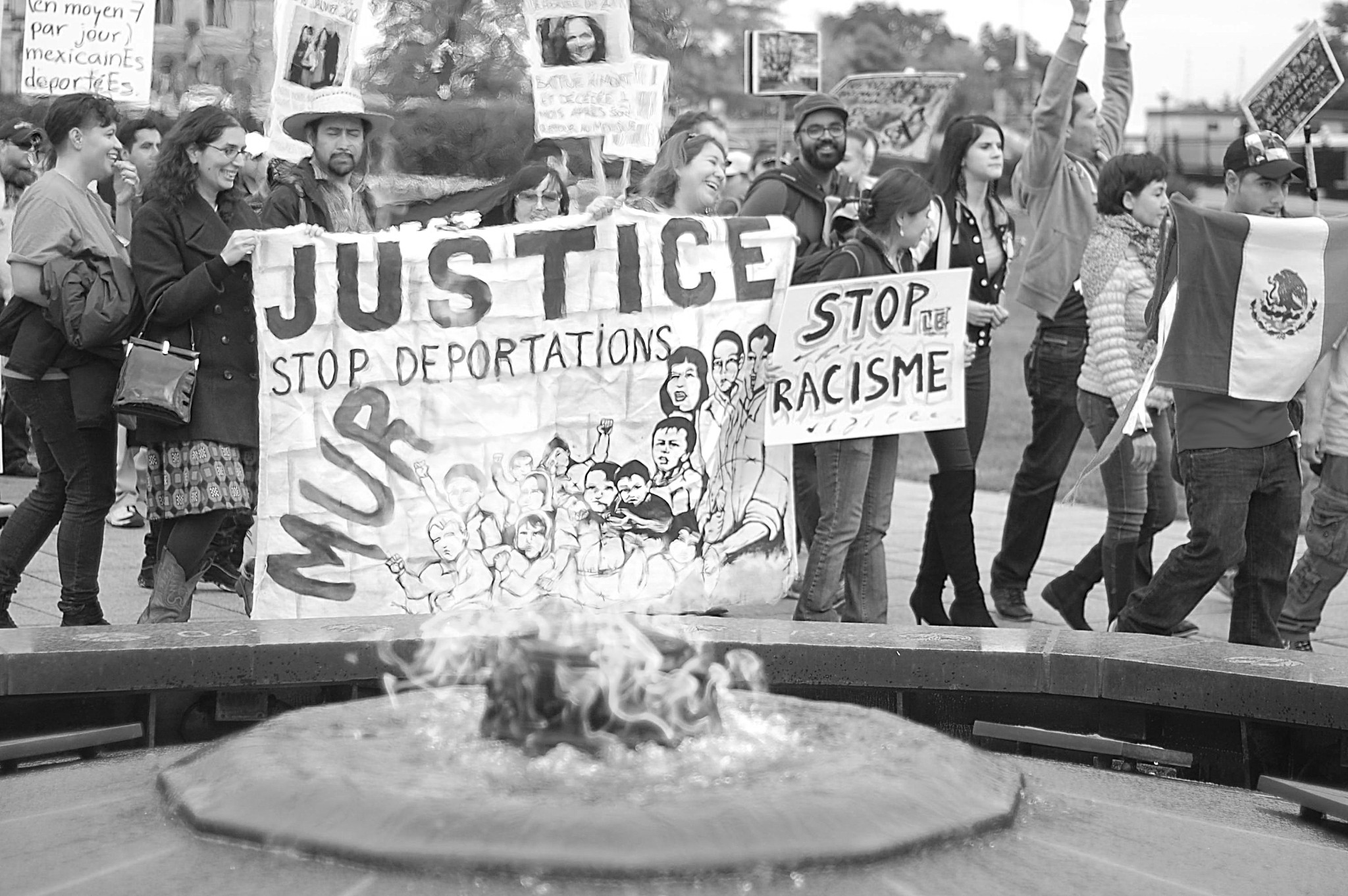Mexican Asylum-Seekers Take Human Rights Demands to Ottawa
Mexican Asylum-Seekers Take Human Rights Demands to Ottawa

Over 200 refugees, migrant workers, activists, and supporters rallied at Parliament Hill on Oct. 2 to demand regularization for Mexican asylum-seekers ahead of Ottawa's implementation of Bill C-31, “An Act to amend the Immigration and Refugee Protection Act, the Balanced Refugee Reform Act, the Marine Transportation Security Act and the Department of Citizenship and Immigration Act.”
Regularization would give asylum-seekers similar access to public services that permanent residents receive, such as health care and education for their children. “Regularization means that all people already here [could access] every single human right that we all should have, and that we don't have,” explained Romina Hernandez, a Montreal-based activist with Mexicanos Unidos por la regularizacion (MUR).
MUR is an organization of Mexicans living in Quebec awaiting rulings on their asylum claims. Some have already been ordered deported.
Sponsored by Citizenship and Immigration (CIC) Minister Jason Kenney, bill C-31 claims to expedite the process of hearing asylum-seekers' cases. This is done in part by giving the CIC unprecedented authority to make rulings that are unappealable, and by designating whole countries “safe” or “unsafe.”
Bill C-31 was signed into law on Jun. 28, but Kenney has not yet released his list of “safe” countries.
“Some people were here for three years and haven't succeeded in getting the proof they need to make their case because of how difficult it is to get official papers from the [Mexican] police. Now they will have to present their case in three weeks. It's a war that Harper is doing against all of the refugees,” Annie Lepalmne, a MUR spokeswoman, explained.
The Canadian Civil Liberties Association, Canadian Council for Refugees, Canadian Association of Refugee Lawyers, and Amnesty International have called for the withdrawal of C-31, citing its hasty timelines, over-generalization of countries and disregard for individual circumstances.
Organizing against C-31 has been ongoing in Montreal for nearly a year.
“We have been doing demonstrations almost every month inside of the refugee board in Montreal trying to raise awareness in the public about these issues,” Lepalmne said.
MUR took their fight to Ottawa to raise awareness about the vulnerability of Mexican asylum-seekers and to clarify that despite an asylum rejection rate of 90 percent from Canada, Mexico is not a safe country.
“We came here to build solidarity with our community in Montreal and with people from Ottawa,” Hernandez said. “We want to tell the media and the government that we are in a dangerous and vulnerable situation. We want complete regularization for refugees and asylum seekers.”
The march stopped for speeches at the Prime Minister's Office (PMO), the Human Rights Monument, and CIC. It then continued back to Parliament.
As Carlos explained outside CIC, “You're telling tourist people not to go to Mexico because it's dangerous, and on the other hand you tell Mexican refugees - no! Go back to your country! Please do the right thing. Let Mexican people get the rights. We are just asking for equality.”
The right to asylum is not a question of generosity, but one of international law.
“In the Geneva convention it is written that you cannot refuse a refugee that comes without papers,” said Lepalmne. “But that's what Canada is doing.”
Even before the establishment of the North American Free Trade Agreement (NAFTA) in 1994, travel between Canada, the United States, and Mexico has been visa-free. In 2006, the Mexican government declared a “war on narco-traffickers” and deployed their military throughout the country.
The loss of lives and systemic insecurity in Mexico has become severe.
Carmella informed the crowd through a translator that over 50,000 deaths have been documented in the last 6 years. “People are found dead in the street everyday”
“The Canadian government is part of NAFTA and this NAFTA should not only be the right of commerce, people should not be denied the right to asylum,” he said.
The ease with which business interests flow across borders was starkly juxtaposed by the difficulty marginalized people experience in eluding deportation. Yet the very opening of borders to regional economic integration under NAFTA, MUR explained, helped put in place a vicious cycle that the signatories to NAFTA must begin taking responsibility for.
“90 percent of the mines in Mexico are run by Canadian corporations. These corporations are directly linked to human rights abuses by contracting organized criminal groups to put pressure on people who practice any sort of resistance,” explained Adrian.
Hernandez argued that freedom of economic movement must not exclude people themselves. The government “doesn’t want to stand up for human rights and say Mexico is not a safe country because it is not in their economic interest,” she said.
“Canada's dirty little secret is that it likes to pretend that it's the human rights guy, that the US is the bad guy,” Canadian Union of Postal Workers' Dave Bleakney explained outside the PMO.
“But Canada does the dirty work. It allows mining companies that would never sign up in the United States because they would be liable for the things they do in other countries.”
The hostility towards alleged “bogus” refugees has created much fear among asylum-seekers.
"We are never sure of how many people will actually make it out to a rally," explains Simon, an Ottawa-based organizer of the march. "These are very vulnerable people, many without proper documents, and it takes an awful lot of courage to risk attending these public demonstrations in a hostile political climate."
Kenney's list of safe countries is expected to be released any day now.
Editor's note: Where names are italicized, pseudonyms are used to protect the identities of speakers.
This article first appeared in the Leveller, Vol. 5, No. 2 (Oct./Nov. 2012)

